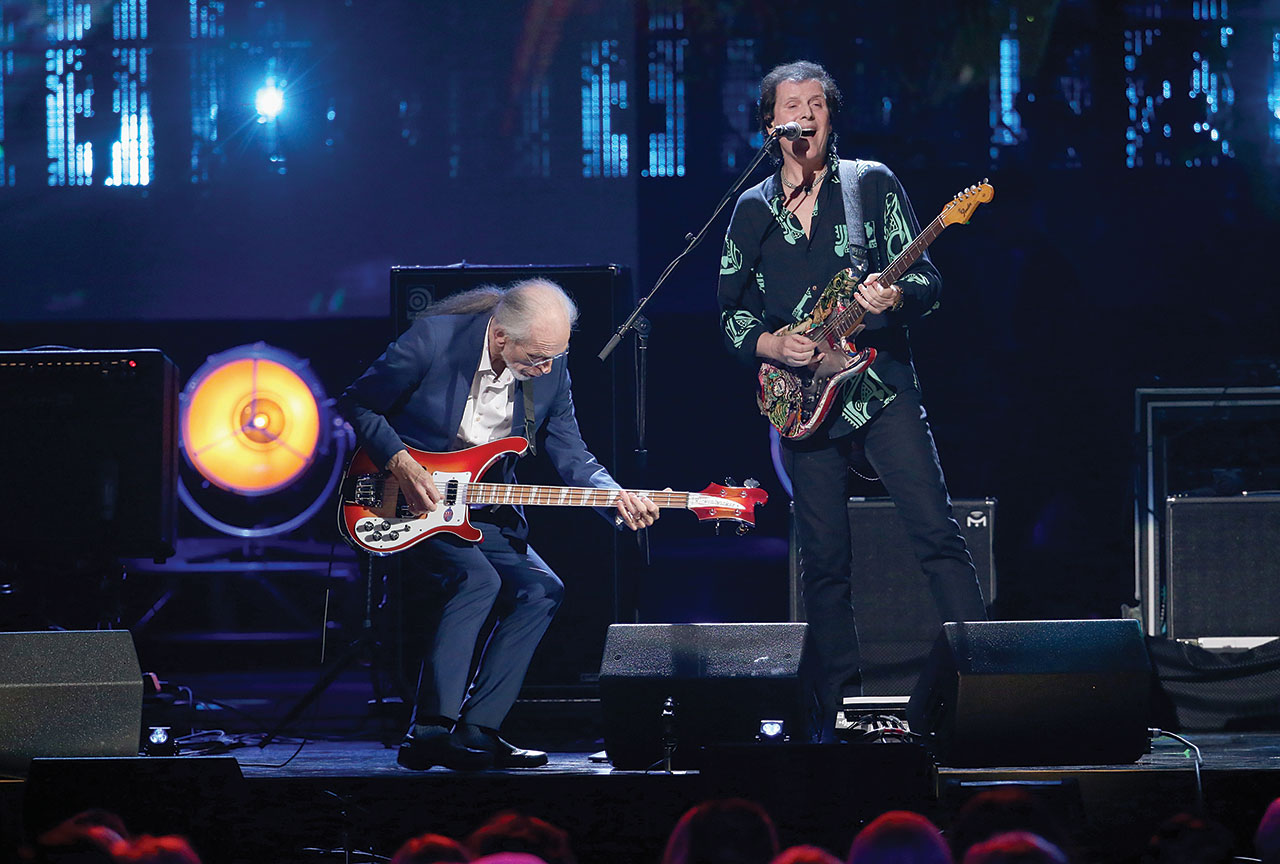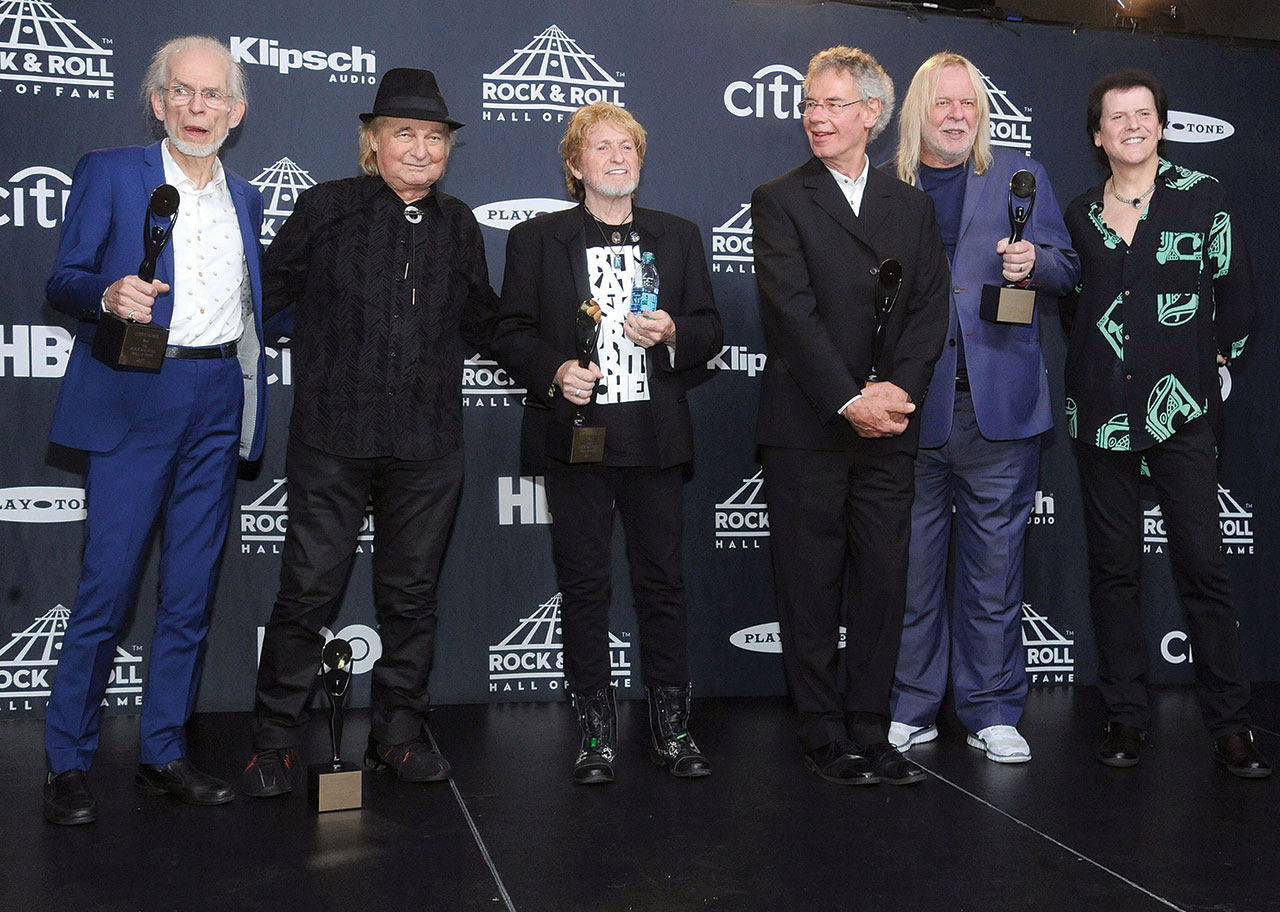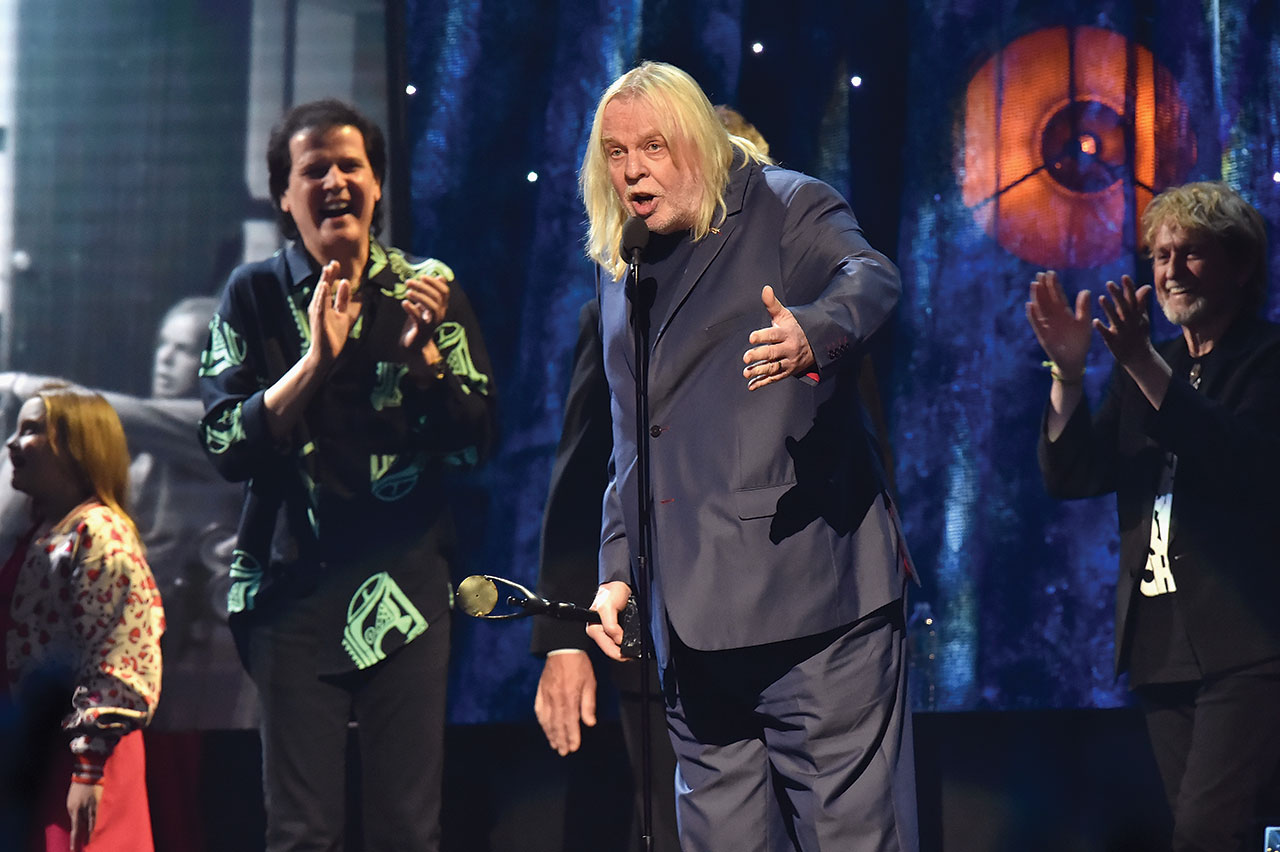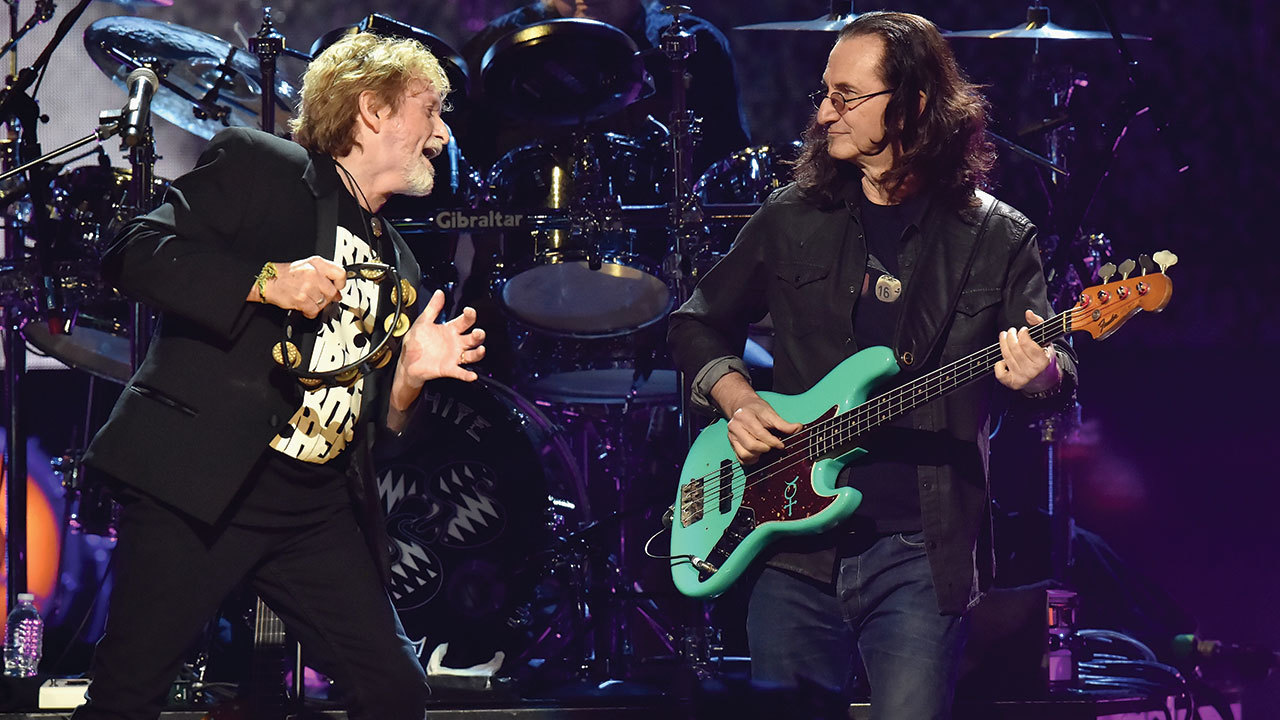Since it was established in 1983 by Rolling Stone magazine founder Jann Wenner, the Rock And Roll Hall Of Fame has largely kept progressive rock at arm’s length. The organisers’ sniffiness has meant that just a handful of prog bands and artists have been inducted over the years: Frank Zappa (1995), Pink Floyd (1996), Genesis (2010), Rush (2013) and Peter Gabriel (2014).
There are some glaring omissions – King Crimson, ELP, Jethro Tull – but one name stands out: Yes. As one of the genre’s founding fathers and band who did more than any to popularise prog, their absence was grating.
All that changed this year when the band were finally accepted into the Hall Of Fame via a public vote. Controversially, the institution’s complex rule system meant that of the 17 people who have officially passed through the band’s ranks, just eight were eligible: Jon Anderson, Steve Howe (who was interviewed for this piece, but subsequently asked for his quotes not be used), Trevor Rabin, Bill Bruford, Alan White, Tony Kaye, Rick Wakeman, and, posthumously, Chris Squire. That meant no place for founding guitarist Peter Banks, vocalist/producer Trevor Horn or current members Geoff Downes, Billy Sherwood or Jon Davison.
The issue was clouded further by the fact that there are two incarnations of Yes in existence – the Yes led by Howe and Alan White, and the version featuring Anderson, Rabin and Wakeman called, until recently, ARW.
The Hall Of Fame was a chance for both halves to come together and potentially settle their differences. As with most things involving Yes, the reality proved to be more complicated…
Jon Anderson: It started about 15 years ago, when I was on tour with Yes. Management at the time kept saying, “We’re going to get you in the Hall Of Fame.” I said, “[Shrugging] OK…” And this went on for about four years, and I said, “Forget about it – don’t even talk about the Hall Of Fame until it happens.” Of course, it took its time.
Rick Wakeman: There have been so many musicians that deserved induction and were dead before it happened. Jon Lord is an example – Deep Purple got in so late. And when Yes suddenly get inducted, and Chris had died the year before – the only solid guy throughout the entire history of Yes – that made me angry. I said, “I’m not going. I feel that’s an insult.” Then I got the message back that they were going to induct him posthumously. Then I went, “OK. If you do that then I’ll turn up.”
Geoff Downes: Was I unhappy about not being inducted? No. Had it been maybe two or three years ago when Chris was alive, I’m sure myself and Patrick [Moraz] and a number of others – maybe Trevor Horn – would have been inducted. But I’m not upset.
Billy Sherwood: It’s no secret that Yes is political as hell – it’s always been that way. It seems to be that’s one of the things that drives the engine. It should be a reality TV show.
The current and past members of Yes convened in New York the day before the induction ceremony. Given the band’s turbulent history and the sometimes strained personal relationships, there was the potential for tension between the two camps.
Jon Anderson: We met the night before. We were staying in the same hotel as the other Yes. There were smiles and “Hi!”s and things like that.
Rick Wakeman: Were we cordial? Depends what you mean by cordial. Did we laugh and joke and muck around? No. Were we polite to each other? Yes.
Alan White: I basically haven’t fallen out with anybody, I don’t think. We were talking together in different ways. I think we just got on with, it was something we got to do together, and I felt good about the evening.
Rick Wakeman: It was nice to see Alan, who had been really ill. It was nice to chat with him. Then you get into the real nitty gritty of getting together to rehearse…
Trevor Rabin: The sad thing is that there were really no real rehearsals. There was a lot of posturing and crap going on, and I could have done without all that stuff.
Jon Anderson: Steve wasn’t the most – what’s the word? – affable person. He can be a little bit stubborn. So I went over and shook his hand: “How you doing Steve?” And he was, like, [reserved] “Hello.” OK, I’ll just get on with it and have fun…

The induction ceremony itself took place on April 7 at the 19,000-capacity Barclays Centre in Brooklyn, New York. Other inductees included Pearl Jam, Journey, ELO, Joan Baez and rapper Tupac Shakur, but the eyes of all prog fans were on Yes.
Geddy Lee (induction speech): It’s not overstating things to say [Yes] changed the way I played and listened to music forever. So here we are, decades later, and the music of Yes is still echoing down through the years, showing me that music truly is a continuum.
Geoff Downes: I liked Rush’s induction speech. When Geddy Lee was inducted [in 2013] he said he thought it should have been Yes.
Jon Anderson: I was so nervous. I’m generally not nervous onstage at all, but when I got onstage to speak my nerves kicked in. I was in a state, actually. All I wanted to do was get up and sing.
Steve Howe (acceptance speech): Fame is fickle for many people, and some may long to bask in its glory. Others merely attempt to gain notoriety for their musical endeavors. Well, since music speaks long after its creation, this service has a payment for those with the respect for those who are no longer with us today. Allowing those to remain, to shine a light on all those who contributed to those such great ideas and melodies and lyrics and arrangements and direction with this Yes music.
Billy Sherwood: I thought Steve’s speech was really eloquent. I thought he spoke the most about what the essence of Yes really was.
Alan White: Steve is a little bit more serious about Yes music. With his guitar, he’s almost religious about it. Rick’s speech? It depends whether you want to listen to music or dirty jokes…
While the rest of the band members gave speeches that were heartfelt and respectful, Wakeman launched into a stand-up comedy routine that included gags about wanking, erectile dysfunction and prostate examinations.
Rick Wakeman: Joan Baez’s speech was great, and it was lovely to see Jeff Lynne and Roy Wood together. And then it all started to get a bit boring. I looked around and nobody was listening. Everybody was talking and drinking champagne. I thought, “This is ridiculous.”
Jon Anderson: I said to Rick, “Are you going to tell any jokes?” And he said, “I don’t know, it’s such a big audience, it might not go down well.”
Rick Wakeman: It was actually our manager and agent who went, “Go on” at the table. And we got on the stage and Trev went, “Go for it.” So I thought, “Sod it” and went for it.
Jon Anderson: Rick started off and the audience were going bananas. Why not have humour? It’s called fun.
Jon Davison: Rick’s speech had everyone cracking up. We were all at our banquet tables and not really expecting that, it threw everyone for a loop. He had some startling references. It was obvious he was making a statement.
Alan White: Obviously it’s going to appeal to certain people, whereas certain stalwart fans didn’t like the fact that he did that amongst all the serious Yes music.
Billy Sherwood: Oh boy. I would have really liked to hear more about Yes, to be honest.

Not everyone in Yes loved Wakeman’s speech. In a subsequently deleted blog post, Geoff Downes accused Rick Wakeman of “making a prick of himself”, while Billy Sherwood criticised the keyboard player for not leaving time for Chris Squire’s widow Scotty, who had joined the band onstage, to speak.
Rick Wakeman: That was totally not true. They programme who can speak and who can’t. And the programme for who could speak was Jon and Trevor, Steve, Alan and myself. Bill [Bruford] was not programmed to speak. But we wanted Scotty onstage with us, and if you listen at the end I did craftily try to get her up to the mic. I said, “Welcome Chris’ wife Scotty…”, but the Hall Of Fame weren’t having any of it. So unfortunately that’s a classic example of somebody not knowing facts.
Billy Sherwood: I made a personal comment which sometimes I like to do. But it wasn’t nasty or anything about anybody’s skill-set or personality. I just said what I felt: that I’d have liked to have heard more about Chris and Yes.
Geoff Downes: I thought maybe Chris should have had more of a mention in there. But these things are spur of the moment. People maybe just forgot about saying anything important about him. That’s the only thing I was disappointed about. Chris being such an essential part of Yes – he was not really honoured in as equal a way as some of the other people.
Jon Davison: We’re trying to take the high road. They’ve taken a lot of public stabs at us. We’ve tried to maintain some dignity, and of course that weekend everybody was together and emotions were running high. I think Geoff and Billy flipped a bit there, but they were apologetic to the fans about that. We quickly removed those statements and we’re trying to move forward.
Yes put aside their issues for a two-song performance that saw Anderson, Wakeman, Howe and White sharing a stage for the first time since 2004. For Roundabout, they were joined on bass by Geddy Lee, while Owner Of A Lonely Heart saw Steve Howe swapping his guitar for four strings and ended with Rick Wakeman strapping on a key-tar.
Trevor Rabin: It was a little weird, but some of those guys are not the guys we worked with. So it was a bit contrived, musically.
Geoff Downes: I thought the band played well, it was good to see Alan back up there cos he had his back surgery some time ago and he seems to be getting back on course. Seeing Steve play bass on Owner… was pretty interesting – he plays very good bass actually. It was a nice event.
Trevor Rabin: It was trying to glue two different elements together. And the glue wasn’t sticking very well. I think it would have been great if we’d all got there with the right vibe and really rehearsed properly.
Jon Anderson: We wanted Lee Pomeroy to play bass on Owner. It’s funny, he wasn’t allowed to because he was already playing for ELO that night. So Steve said, “I’ll play bass.” “Oh, OK, that’s cool…”
Geoff Downes: I think it would have been nice if Billy [Sherwood] had played; he was up for doing it. He’s a very talented guy and it was Chris’ wish that he continued with the band. But I understand the reasons that prohibited him.
Billy Sherwood: There was a question about me playing bass but it didn’t work out and I’m cool with that. I was happy just to be a part of the event.

Inevitably, that wasn’t the end of the matter. Two days after the Hall Of Fame induction, the ARW camp announced they were changing their name to Yes Featuring Jon Anderson, Trevor Rabin and Rick Wakeman, meaning there are now two bands trading under the Yes name.
Jon Anderson: There was a lot of talk about going out as Yes when we started, but I said, “I don’t want to confuse anybody. We’ll go out as ARW to find out who we are musically and how it’s going to work.”
Trevor Rabin: After the very first tour, management started saying, “We are inundated with people saying why are you playing all the Yes stuff but you don’t call yourself Yes? Jon was the guy who started the band.”
Jon Anderson: I do get a lot of mail on my Facebook page: “I went to see Yes and you’re not there any more.” That’s been going on for years now. Yesterday I was shopping and somebody came up and said, “So you’re touring with Todd Rundgren?” And I said, “No, that’s not me, that’s the others.”
Rick Wakeman: People get confused as to which is which. At concerts, fans hold up signs saying, “You are Yes.” We had the same thing with ABWH.
Jon Anderson: You should not confuse the fans. You should say who you are. We’d said, “You should go out as Yes featuring Steve, Alan and whoever is in the band and we’ll go out as Yes featuring us three,” and they declined. That was before the actual Hall Of Fame.
Geoff Downes: They’re perfectly entitled to call themselves whatever they want to call themselves. We’re focusing on what we’re doing and that’s all we can do. We wish them well. We’ve got no axe to grind. We hope they succeed. They may have something against us. If they do that’s their problem, not ours.
Jon Anderson: Would the two parties come together? Your guess is as good as mine. If it’s going to happen, it’ll happen, and it should happen in the best of ways. If the band went out and said who they are and not fool the public, life would be much easier for them.
Trevor Rabin: I can only speak for myself, but I have personally no interest in it. You’d have to ask Jon or Rick, but I certainly wouldn’t.
Rick Wakeman: There’s too much water under the bridge. There’s a lot of issues that will never be made public because there’s no point. Do I ever see a rapprochement? Absolutely not. I can bet my life on it.
What happens next is anyone’s guess. While both parties are legally entitled to use the Yes name, the band’s fractious history would suggest there may be stormy waters ahead.
Rick Wakeman: There’s a couple of Bucks Fizzes out there. I think there’s about 826 Drifters. There’s nothing wrong with two Yeses.
Alan White: The internal politics with the band are such that we’re both allowed to use the name really so… that’s the reason we’re going ahead and doing this. I’m just carrying on what I started doing 45 years ago.
Rick Wakeman: I’ve always said all along, I don’t care what they do. They’re fully entitled to do whatever they like. It makes no difference to me. I have no idea what they’re doing, where they’re playing. It’s of no interest to me. Why would I look at them and go, “Oh, it’s a rival band out there”? They’re not a rival band. They’re another lot out there playing Yes music, same as we are. We’re just doing it our way and we’re very happy with what we’re doing, so why the hell should I worry about it? Good luck to them.
Billy Sherwood: Would I go see them if they came to town? I would if I was free! Sure. I’m a Yes fan. In 2017, the more Yes, the merrier. As long as it’s done with integrity and the delivery system is sound, no harm done.
Jon Anderson: Somewhere, Chris Squire is having a good laugh at all this! He’s loving every moment!
Beyond and before: What the future holds for Yes
Sepultura's Andreas Kisser pays tribute to his prog heroes Yes
